Introduction to "Khartoum" |
Read more
at in70mm.com The 70mm Newsletter |
| Written by: Sheldon Hall | Date: 11.04.2009 |
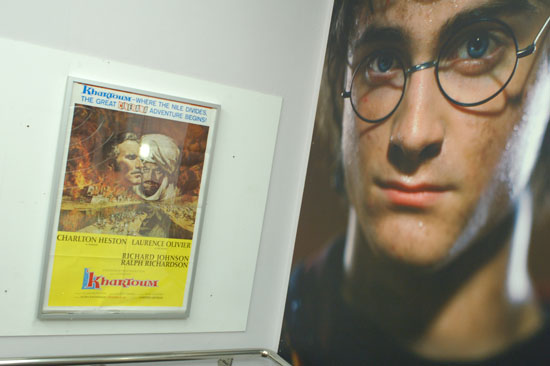 As you know, I’m here to introduce
"Khartoum", starring Charlton Heston, directed by Basil Dearden, and photographed by Edward Scaife in Ultra Panavision 70. But had history taken a different course and the film turned out as originally planned, I might instead have been introducing
"Khartoum" starring Burt Lancaster, directed by Lewis Gilbert, and photographed by Freddie Young in 35mm Panavision. As you know, I’m here to introduce
"Khartoum", starring Charlton Heston, directed by Basil Dearden, and photographed by Edward Scaife in Ultra Panavision 70. But had history taken a different course and the film turned out as originally planned, I might instead have been introducing
"Khartoum" starring Burt Lancaster, directed by Lewis Gilbert, and photographed by Freddie Young in 35mm Panavision.Production (on a budget of $6.2 million) had been scheduled to begin in February 1965, with location shooting in "Khartoum" itself. But in November 1964, a wave of anti-American protests and civil disturbances in the Sudan led United Artists and the producer, Julian Blaustein, to decide that it would not be safe to film there. Although sets were already under construction, the shoot was cancelled and Blaustein began to look elsewhere for an alternative location. He considered Spain and Morocco, both of which had been utilised in the filming of "Lawrence of Arabia", but eventually decided on Egypt, with interiors at Pinewood Studios. The revised schedule kicked off in August 1965, by which time the deal to release the film as a Cinerama roadshow had been confirmed. But the delay of seven months meant that the key players had been obliged to take up other commitments: Lancaster starring in "The Professionals", Gilbert directing a small film that turned out big, "Alfie" and Young taking over from Nicolas Roeg when he failed to get on with David Lean in photographing "Doctor Zhivago". (Gilbert and Young subsequently worked together on the fifth James Bond film, "You Only Live Twice", in 1967.) |
More
in 70mm reading: “Broadsword Calling Danny Boy” Widescreen Weekend Report 2009 WSW 2009 program Widescreen Weekend Home Mr. Derren Nesbitt ("Major von Hapen" in "Where Eagles Dare") Lost Orphaned Films Abandoned in Basement The History of 70mm Short Subjects Ramon's WSW review and Audience feedback Images: Friday, Saturday and Sunday "Audience on Stage" and Academy of the Wide Screen Weekend |
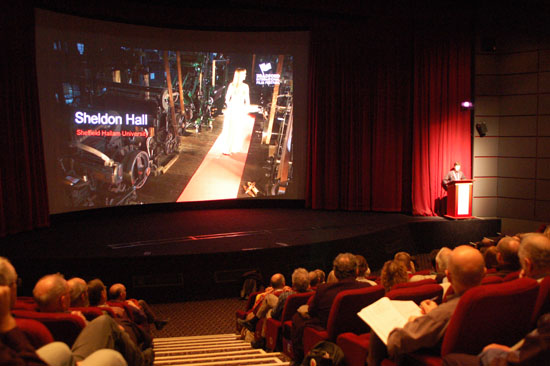 Filming in Egypt brought further problems. According to Blaustein (Variety, 12 January 1966), local traders could not be persuaded that United Artists was not as wealthy as General Motors and proceeded to fleece the unit for all they could get while struggling to deliver the needed facilities. Furthermore, towards the end of the location shoot the British technical unions opted to work to rule, thus extending the schedule further. But despite these liabilities, the change of star turned out to be fortuitous. Heston accepted the part of General Charles Gordon at short notice (he had first been approached for the role two years earlier) and achieved an impeccable English accent with the aid of a voice coach who taught him the clipped delivery of a Victorian Army officer. (Lancaster, fine actor though he was, later demonstrated his limited ability in assuming accents other than his own when he played another Victorian Army officer, the Irish Colonel Anthony Durnford, in
"Zulu Dawn".) Filming in Egypt brought further problems. According to Blaustein (Variety, 12 January 1966), local traders could not be persuaded that United Artists was not as wealthy as General Motors and proceeded to fleece the unit for all they could get while struggling to deliver the needed facilities. Furthermore, towards the end of the location shoot the British technical unions opted to work to rule, thus extending the schedule further. But despite these liabilities, the change of star turned out to be fortuitous. Heston accepted the part of General Charles Gordon at short notice (he had first been approached for the role two years earlier) and achieved an impeccable English accent with the aid of a voice coach who taught him the clipped delivery of a Victorian Army officer. (Lancaster, fine actor though he was, later demonstrated his limited ability in assuming accents other than his own when he played another Victorian Army officer, the Irish Colonel Anthony Durnford, in
"Zulu Dawn".) Laurence Olivier had directed Heston on the Broadway stage in the flop play "The Tumbler" in 1960, and described him in his book Notes on Acting as a “consummate actor”. Heston, in his turn, had looked forward to working with Olivier on screen, and now found his opportunity in "Khartoum" (as well as the chance of acting with Olivier’s contemporary, Ralph Richardson). When the film opened, it was Heston who got the lion’s share of critical praise: Olivier had also recently filmed his stage production of "Othello", and several critics unkindly wrote that he seemed to be giving the same performance, in the same make-up, as the Mahdi. The British Film Institute’s journal Sight and Sound commented that Heston “wiped the floor” with him. |
Film Introductions: "The Bible...in the beginning" "How the West Was Won" "The King and I" "This is New Zealand" "West Side Story" "Faubourg 36" 70mm in Paris "This is New Zealand" 3-strip EXPO Film From New Zealand The M.C.S.-70 Process Internet link: |
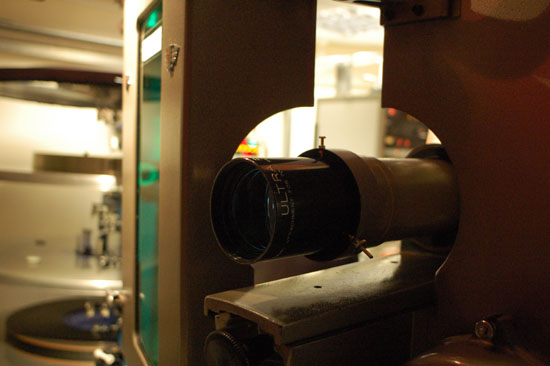 Basil Dearden (who had been selected as replacement director after Carol Reed, Ken Hughes, Guy Green and Guy Hamilton had all turned the picture down) was a veteran of Ealing Studios and had mainly directed small-scale social-problem dramas such as
"Sapphire"
(1959) and "Victim" (1961). Interviewed by Variety (20 October 1965), he expressed the wish that
"Khartoum" could be shown to critics in a 35mm reduction print rather than in 70mm Cinerama, as he felt that reviewers tended not to take large-screen spectacle films seriously. In the event, he need not have worried. Despite their initial suspicions of an American actor playing a British national hero, the UK press greeted the film with rave notices. It was a substantial commercial success in Britain, playing for a year as a roadshow following its Royal World Premiere at the London Casino on 9 June 1966 (where it ran for nine months), with general release on the Rank Odeon circuit beginning in August 1967. A number of American critics placed the film in the same category of an unusually “thoughtful” spectacle as several other contemporary roadshows, such as
"Hawaii",
"The Sand Pebbles" and
"The Bible", but
"Khartoum" did not perform as well at the box office in the US as it did in the UK. American audiences apparently had little knowledge of Gordon and little interest in British military history; the film’s title was sometimes changed in press advertising to
"The Battle for Khartoum" to clarify its subject matter. Basil Dearden (who had been selected as replacement director after Carol Reed, Ken Hughes, Guy Green and Guy Hamilton had all turned the picture down) was a veteran of Ealing Studios and had mainly directed small-scale social-problem dramas such as
"Sapphire"
(1959) and "Victim" (1961). Interviewed by Variety (20 October 1965), he expressed the wish that
"Khartoum" could be shown to critics in a 35mm reduction print rather than in 70mm Cinerama, as he felt that reviewers tended not to take large-screen spectacle films seriously. In the event, he need not have worried. Despite their initial suspicions of an American actor playing a British national hero, the UK press greeted the film with rave notices. It was a substantial commercial success in Britain, playing for a year as a roadshow following its Royal World Premiere at the London Casino on 9 June 1966 (where it ran for nine months), with general release on the Rank Odeon circuit beginning in August 1967. A number of American critics placed the film in the same category of an unusually “thoughtful” spectacle as several other contemporary roadshows, such as
"Hawaii",
"The Sand Pebbles" and
"The Bible", but
"Khartoum" did not perform as well at the box office in the US as it did in the UK. American audiences apparently had little knowledge of Gordon and little interest in British military history; the film’s title was sometimes changed in press advertising to
"The Battle for Khartoum" to clarify its subject matter. |
|
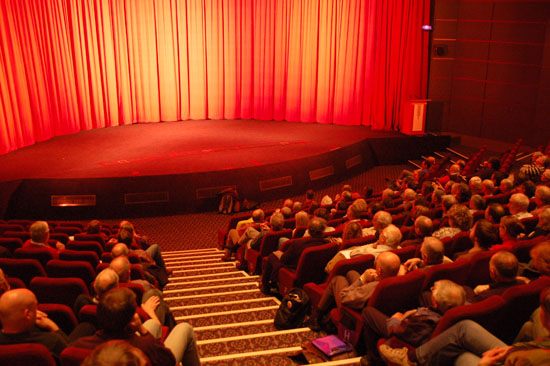 If I may digress into personal autobiography, I was not old enough to see Khartoum on its original release and even missed its first television broadcast, on 24 December 1972, because I was watching another roadshow,
"West Side Story", making its UK TV debut on another channel. But this too turned out to be fortuitous, as it meant that my first viewing of the film was on the big screen in a revival screening at Butlin’s holiday camp, Filey, in the Summer of 1973. (I saw
"Carry On Matron" in the same week – what a double bill!) I have seen
"Khartoum" many times in various formats since then, and it was among the first films I recorded off-air, even before I had acquired a video recorder: I taped the soundtrack on audio cassette and consequently know the dialogue almost verbatim. If I may digress into personal autobiography, I was not old enough to see Khartoum on its original release and even missed its first television broadcast, on 24 December 1972, because I was watching another roadshow,
"West Side Story", making its UK TV debut on another channel. But this too turned out to be fortuitous, as it meant that my first viewing of the film was on the big screen in a revival screening at Butlin’s holiday camp, Filey, in the Summer of 1973. (I saw
"Carry On Matron" in the same week – what a double bill!) I have seen
"Khartoum" many times in various formats since then, and it was among the first films I recorded off-air, even before I had acquired a video recorder: I taped the soundtrack on audio cassette and consequently know the dialogue almost verbatim. One other scheduled TV screening is worth mentioning because it did not actually take place. BBC One planned to show the film on a Sunday afternoon in 1991 but at the last minute cancelled the broadcast, which was deemed inappropriate under the circumstances. The day before, President George Bush (Senior) had given the order for Exocet missiles to be fired on Bagdad, marking the outbreak of the first Gulf War prior to the land invasion of Iraq. Why should the BBC be moved to cancel the screening of a twenty-five-year-old film about a century-old colonial conflict in the context of a new war in the Middle East? You will have to decide the answer to that question for yourselves! |
|
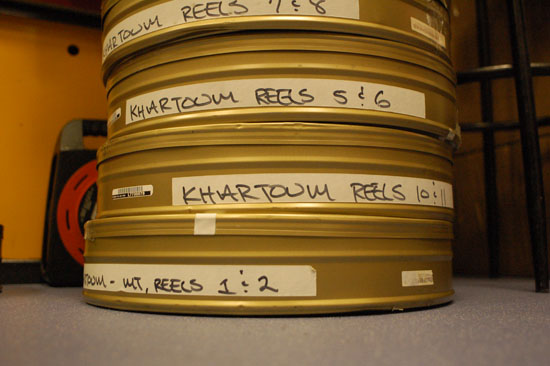 Finally, we were reminded in Cineramacana today about the loss of a number of noted film industry veterans in the last year, including Charlton Heston.
"Khartoum" was, along with the Western
"Will Penny", one of Heston’s two favourites among his own films. It was based on a script which he regarded as one of the best he’d ever read, requiring no major changes in the passage from page to screen. (The screenplay was written by Robert Ardrey, who has since become better known for non-fiction works of social anthropology such as The Territorial Imperative and African Genesis.) Echoing Tony Earnshaw’s remarks in his talk on Richard Burton, Heston has been my own favourite actor since childhood. The experience of seeing such films as
"Khartoum",
"The Ten Commandments",
"Ben-Hur" and
"El Cid" at an early age is one of the things that made me want somehow to dedicate my life to the cinema. It’s a pity that Heston is today better known to young people for his controversial political views than for his performances, which are surely deserving of a retrospective season at a future Bradford Film Festival: no other star has been more frequently associated with wide-screen, large-format and large-scale films. But for now I would like to follow a precedent established in previous years by Tony Sloman and, with your permission, dedicate this screening of a new 70mm print of
"Khartoum" to the work and the memory of Charlton Heston. Finally, we were reminded in Cineramacana today about the loss of a number of noted film industry veterans in the last year, including Charlton Heston.
"Khartoum" was, along with the Western
"Will Penny", one of Heston’s two favourites among his own films. It was based on a script which he regarded as one of the best he’d ever read, requiring no major changes in the passage from page to screen. (The screenplay was written by Robert Ardrey, who has since become better known for non-fiction works of social anthropology such as The Territorial Imperative and African Genesis.) Echoing Tony Earnshaw’s remarks in his talk on Richard Burton, Heston has been my own favourite actor since childhood. The experience of seeing such films as
"Khartoum",
"The Ten Commandments",
"Ben-Hur" and
"El Cid" at an early age is one of the things that made me want somehow to dedicate my life to the cinema. It’s a pity that Heston is today better known to young people for his controversial political views than for his performances, which are surely deserving of a retrospective season at a future Bradford Film Festival: no other star has been more frequently associated with wide-screen, large-format and large-scale films. But for now I would like to follow a precedent established in previous years by Tony Sloman and, with your permission, dedicate this screening of a new 70mm print of
"Khartoum" to the work and the memory of Charlton Heston. |
|
|
Go: back
- top - back issues
- news index Updated 22-01-25 |
|
